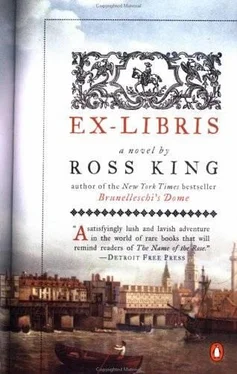Was there ever a summer when the rains fell so heavily? Whenever I look back on those days it seems that rain is streaming from a leaden sky. The sun disappeared for weeks on end behind sullen scuds of cloud; it might have been October or November instead of July. In London the gutters filled and flowed, feeding the swollen Thames. The window-sills and clothes-lines no longer bore their swags of laundry, for there was never enough sunshine to dry anyone's linen. In the countryside the rivers overflowed their banks, running in torrents across stunted fields, sweeping away roads and bridges. Fasts were observed and days of humiliation observed, because in time it was decided that the incessant rains must be the Lord's angry judgement on the people of England for failing to punish the regicides. Before the year was out the traitors would be hunted down in Holland and hanged at Charing Cross, Standfast Osborne among them. Huge crowds thronged Whitehall and the Strand to watch the spectacle, and a thousand voices cheered as the bodies were cut down and the butchers stepped forward to begin their work. One by one the bellies of the regicides were expertly slit and the dripping lengths of viscera thrown on to bonfires that sizzled and snapped under the bleak October rain. Nothing like it had been seen since the days when Queen Mary martyred Protestants in Smithfield, or Queen Elizabeth Jesuits at Tyburn. Even death was considered a punishment too soft for Cromwell, so his carcass was excavated from its tomb in Westminster Abbey and hauled in a cart to Tyburn, where it was hanged and then beheaded. The rotted corpse was buried under the scaffold while the skull was slathered with pitch and stuck on a pike on Westminster Hall, from where it glowered at the crowds hurrying past the bookstalls and printsellers below. Small boys threw stones at it, others laughed and cheered as the ravens fought over the eye-sockets. Revenge, revenge-everyone in those days was bent on revenge.
And was I, too, bent on revenge? Was it that which made me embark, feverish and ill, on that final, fateful journey? Was it retribution that I hoped to find as I set out from Alsatia, in the midst of the deluge, in the back of a mail-coach jostling along the Strand and into Charing Cross, heading slowly westward?
I remember the sodden morning of my departure, in contrast to those preceding it, in vivid detail. It was still only July, but already the scaffolds were being built for our little auto-da-fé. Or perhaps it was the beginning of August. I had lost all track of time. How many delirious days had passed since I had returned to Alsatia from the Rolls Chapel? Four or five? As much as a week? I recalled very little of those intervening days, and nothing at all of my journey back to the Half Moon Tavern from that dark labyrinth under Chancery Lane. How did I return, by hack or by foot? What must the hour have been when at last I found myself, dazed and alarmed, inside my tiny room?
The next few days-or the next week-had passed horribly. I fell into a nightmarish sleep, from which I awoke now and again, sweating and sore, unable to move, tangled in clammy bed-linen like a panicked beast trapped in a net. At one moment the chamber seemed unbearably hot; the next, it was freezing-cold. I was hungry and thirsty but too weak, when I tried, to rise from the bed. I have vague memories of footfalls along the corridor. At some point after dusk I was aware of a jingling of keys, the sighing of hinges and, in the doorway, the alarmed face of a chambermaid. Mrs. Fawkes must have arrived shortly thereafter. I seem to remember someone else, a man, shuffling about on the squeaking floorboards. He inspected my tongue, whoever he was, and pressed his ear to my chest and the back of his hand to my brow. It seems I was agued; the result, doubtless, of my little excursion in the Cam, along with my exertions, my travels, my lack of food. I have always possessed a weak constitution. My body as much as my mind craves regularity and custom. To cap it all, my asthma had worsened. My chest was making a braying noise that seemed to alarm all concerned. In one of my few lucid moments it occurred to me how my clients would wonder and exclaim at the news that Isaac Inchbold, the respectable bookseller, had died in a brothel.
Yet Mrs. Fawkes had no wish to let me die; perhaps she was mindful of the reckoning. And so it was that over the next few days I suffered all manner of attentions from a succession of her chambermaids. Every few hours I was spoon-fed broths and gruels, and my aching limbs were rubbed with chamois-leather gloves. I was bled by a barber-surgeon, in whose cup my drained blood looked as bright and volatile as quicksilver. In time I was made to totter down the stairs and into a sweating-house-a hitherto unknown facility-where I bathed in a cistern whose ordinary function (judging from the cavorting pink nymphs painted on the tiles above) was something less salubrious. But the bath seemed to help, as did everything else, and in time I felt better.
One morning when the rainclouds were prowling the horizon I rose from my sickbed, dressed my shrunken limbs in the Cavalier clothing that someone had thoughtfully laundered and folded, then took hold of my thorn-stick and hobbled down the stairs to pay Mrs. Fawkes for her hospitality. Through the windows of each landing I could see, sinking into the rooftops, steadily shrinking as I descended, the turrets and pennants of Nonsuch House, all looking exact and familiar, but also unreal, as if the building were an apparition or a model of itself, or something glimpsed in a dream. The drawbridge was lifting itself skyward in a languid pantomime. At the last turn, the scene vanished from sight, and all at once, wobbling on my stick, I felt choked with grief, hopelessly cut off from my past.
'But, Mr. Cobb…' Mrs. Fawkes had seemed startled by the sight of the gold sovereigns I pressed into her palm. 'But… where will you go, sir?'
'My name is Inchbold,' I told her. I had had enough of lies. 'Isaac Inchbold.' I had turned and was already halfway to the door. Rain was falling heavily now. I watched a stream of water pulsing along the middle of the street. 'I shall go to Dorsetshire,' I told her, realising for the first time what dark skein my fevered brain had been slowly spooling as I lay sweating and trembling in my bed. 'I have urgent business in Dorsetshire.'
***
Six post roads left London in those days: six roads that radiated like the cords of a great web, at whose centre crouched the Postmaster-General and his superior, Sir Valentine Musgrave, the new Secretary of State. Between the radiation of the new royal monopoly, woven into its meshes, was a finer, almost invisible grid of by-posts and 'common carriers': independently run couriers who served the small market towns and remote areas of the kingdom that the coaches of the Postmaster-General had yet to penetrate. These were woefully primitive and disorganised, but spying and smuggling-and the shipping or receiving of unlicensed books-would have been tricky to accomplish without them. In 1657 Cromwell had tried without success to suppress them, and now I supposed they would become the modus operandi of the new King's numerous enemies, the secret channels for new forms of dissent. I caught the first of what would be a half-dozen of them somewhere to the west of Salisbury: a small, slow vehicle, barely more than a covered wagon, that ran a whimsically irregular route through the countryside, through ten miles of detours, flooded hamlets and forced stops, until it was time to wait three hours for the connecting coach to trundle into town, an even smaller vehicle heaped high with demijohns of Tewkesbury mustard and Hampshire honey. But the last coach I caught-the one that finally delivered me to Crampton Magna-was considerably larger and swifter than the others. It also had a familiar symbol, a crux Hermetica, painted on the door in sun-faded gold, just visible between streaks of mud the colour of mature rust.
Читать дальше












